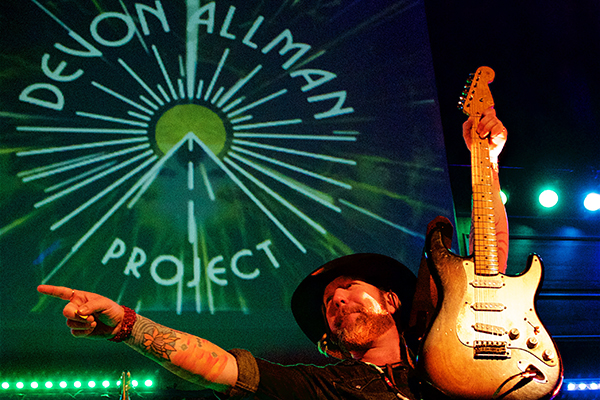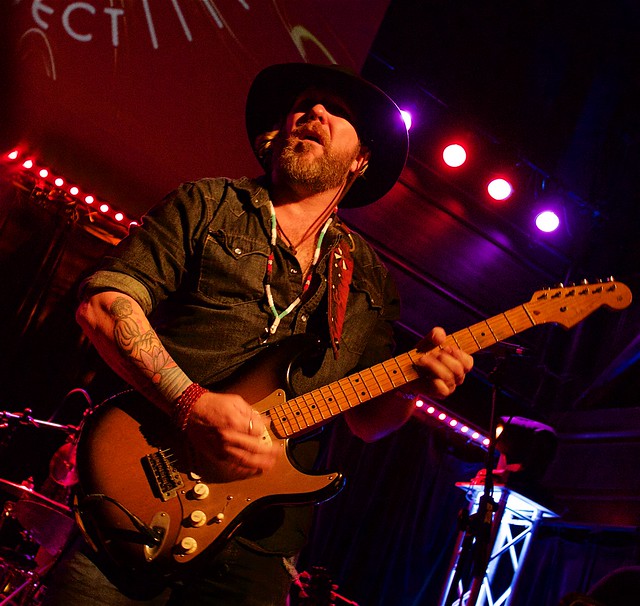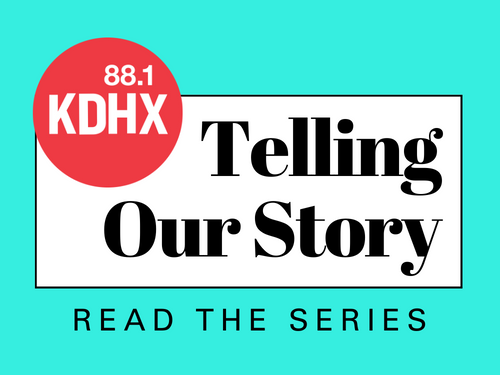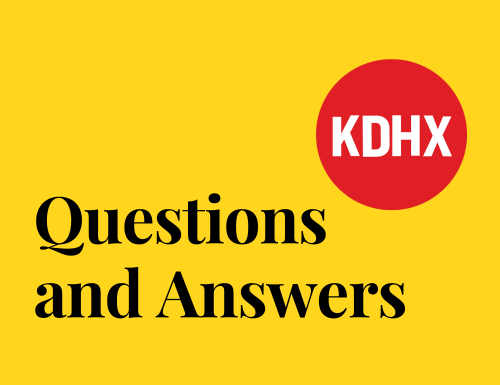
Devon Allman Project brings passion, focus to Old Rock House
By Michael Kuelker
There was a quiet passage in the third song of the set by the Devon Allman Project last Friday night when a chorus of ‘happy birthday’ bubbled up and the surprise is, it came from the audience. While the contingent near the stage didn’t overpower the musicians, they did effect a dipdown and a pause. It was Allman’s 46th birthday, people knew it and their spontaneous recognition of his twirls around the sun added an extra warmth to the glow at the Old Rock House on August 10. It was a moment gratefully acknowledged by the headliner.
Concert Review
The show had been sold out for over a week so the conditions were rock 'n' roll perfect. Hot August night, homeboy returns for first major concert in STL since his hibernation following the death of Gregg Allman in 2017. There was a sense of moment about the gig, that it augured Something New for Devon. So cheek to cheek we stood and smiled or sat outside basking in the city air while the opening band, Tungsten Groove, entertained us with Black Crowes-ish, Delbert McClintonesque charm.
On tour since April and running hard through October, the Devon Allman Project (DAP) features Duane Betts, a talented guitarist-singer, son-of-Dickey. Betts does an opening set with Johnny Stachela on guitar and members of Allman’s band and then joins in for selections of the headlining set. The DAP are Devon Allman on vocals and guitar, R Scott Bryan and John Lum on percussion, Justin Corgan on bass, Nicholas David on keyboards and Jackson Stokes on guitar.
Duane Betts walked onstage with his guitar at 9:07 p.m. and did a little noodling that instantly set the mood, just that kind of stanky, crunchy blend of notes that announces Deep South. The band slid in and like charcoal warming into reds and grays before our eyes, the thing was on. I didn’t recognize the songs Betts sang, but they are pleasing numbers. He is tasteful in his guitar lines with liquid fluidity, a classy player rather than a florid big star guy. His sound evokes the Allman Brothers Band and Dickey Betts’ Great Southern, but he saved the direct nod to the past for the last song of his 35-minute set, a powerful rendition of the instrumental “Hot ‘Lanta.”
With the DAP, Allman has assembled an impressive cast of characters. They are in the midst of a seven-month tour so the feel was of something freshly baked rather than pre-packaged or burned. The band can stretch out but they’re not smashing clocks a la “Mountain Jam” at Ludlow Garage. The DAP gave us an 11-song, 90-minute set beginning with “Mahalo,” a meaty Santana-inspired instrumental which originally appeared on Honeytribe’s "Torch" album in 2006. “Mahalo” seems to be the tour’s regular opening stanza after which it is a varying setlist of Devon Allman material, a healthy array of Allman Brothers Band songs and some wonderfully odd-choice cover tunes.
Speaking of which, the band successfully tackled Otis Taylor’s “Ten Million Slaves” and the Spinners’ “I’ll Be Around.” Allman has a commanding lead vocal on Taylor’s evocation of slave history and trades the original song’s banjo for a churning jangle of guitars. He and his mates’ version of the Spinners’ 1972 hit had a slinky happy groove. Allman clearly enjoys singing these upful-sounding lyrics of longing while the rhythm spirits forward.
For original material aside from “Mahalo,” Allman chose “Left My Heart in Memphis” and “Live from the Heart” and they gleamed. The band pulls off the Memphis song exquisitely, with open space and subtly filled places. With two acoustic guitars to go along with Allman’s electric, “Heart” builds from a medium-paced rhythm and feelgood message to a chugging finish.
On second guitar in the DAP is Tyler Stokes, a St. Louisan, of Delta Sol Revival. Lately he has been leading with his middle name I’m guessing because Jackson Stokes is a moniker that says “deal me in.” Stokes played a large role on Allman’s last solo album, 2016’s "Ride or Die," with both his axe and his pen, co-writing five of the LP’s 12 songs. He can work sympathetically within any number of musical frameworks and peel off the leads with stylish elegance and zeal.
One of the highlights of the evening was the band’s take on Bill Withers’ “Lean on Me” on which the hairy and fancy-hatted Nicholas David sang lead. He just owned it, singing and playing the keyboards soulfully. I imagined Leon Russell circa 1973 up to his knees in Louisiana swampwater. David has enough religion in his voice to run a church.
Add in bass guitar with lots of settings, nimble, scampering, funk-it-up, swing. Add percussion, the dial ranging from percolating to thundersome.
If a medium-good ABB tribute band gets a 6 – and for the sake of argument, let’s calibrate the 6 to be decent and honorable, the band keeping your attention on long jams and radio songs – then the Devon Allman Project is pegging in the red. The band is not designed to purvey “tribute” but whoa daddy, we got great and beautiful versions of “Blue Sky” and “Melissa” and a long, scintillating “Dreams” with all the rhythmic heft and lilt you remember from back in the day.
At one point, four guitarists stood on the front flank to go with the bass, keys and drums, but it didn’t feel like we were being bum-rushed. We’ve all been there, haven’t we, watching Jam Band Delight and too many people onstage with their cacophony of cheer and the ritual back and forth of the lead soloing. Bah! This performance thankfully had a more purposeful nature.
Like with “Dreams” – there are tones, textures, layers. You can’t rock out this one. It’s a masterpiece because just behind the ABB’s terrific power was lift, the muscles you didn’t see behind the flex. The DAP had a stunning convocation on “Dreams.” Devon Allman plays some of it without a pick, the strings getting a tickle with the index finger and thumb of his right hand. After singing about dreams he’ll never see, he takes the first lead, his left hand wringing out vibrato’d notes as he finds the deep waters in the fretboard and takes us sailing. The lead turns to Betts and to Stachela and they take us into thrilling territory and the undertow swells and subsides. It has never failed to reach me, the dynamism of this music and how, from the crest late in the song, it reverts back to the singer and his plainspoken resolve to “pull myself together, put on a new face, climb down off the hilltop, baby, get back in the race.” The full effect is anything but plain.
Visually what we get on this tour are guys playing with focus & passion while a screen flashes images above them provided by the Brotherhood of Light – physics, Memphis at night, shimmering squiggly colors, psychedelic designs, the landscape of the West. It ends with a photo of Betts and Allman dressed ready for Sergio Leone’s "A Fistful of Dollars."
Deeper Dig
Changing subjects, but not really, Gregg Allman. Along with Duane Allman, Dickey Betts, Butch Trucks, Jaimoe and Berry Oakley, Gregg Allman rightly occupies a hallowed vestibule in the church of American music just for what they created in the years 1969-72 alone. Their impact is hard to summarize. The band laid out a map, a generative place with a dense history. “Place” in this sense meaning not just Macon GA or “southern rock” but a real, defined, nook and crannied existential songscape every bit as fertile and throbbing as Faulkner’s Yoknapatawpha County. A world that people wanted to see, dwell in and know themselves; a look, a sound and an ethos that people wanted to emulate and recreate. And there was so much going on vocally whenever Gregg Allman sang. He sounded like a mature road-dogged bluesman by age 22. He did works of distinction and vitality for the whole of his career, and even when the amount of new studio material slowed, he never wandered far from the concert stage. Meanwhile, his personal life was part of the public domain in some strange ways.
What do you do with this if you’re his son? All that blood and weight? Devon’s answer across time has stayed the same: his own thing. His version of the music he is into, which includes but has never been limited to the sounds that make up the Allman Brothers Band.
So the ABB officially retired in 2014 and whatever hopes were harbored for a reunion were put away forever with the deaths in 2017 of Butch Trucks and Gregg Allman. The only surviving members of the original unit are Jaimoe and the long-dismissed and recently un-retired Dickey Betts, both in their mid-70s. All this fuels a hunger among fans of this music for … something. A revival. Take us back.
It’s been a balancing act all his life in terms of how Devon translates Allman-ity into his professional self. From the early 1990s, when I met him, and for about 15 years, he eased off on the famous last name. He was a front man but the bands he was in – the Dark Horses for most of the 90s and then Honeytribe and Ocean Six – weren’t named after him. He banged it out playing clubs on the DIY plan. For slices of this time Devon held straight jobs and then came family of his own to go along with everything a band entails. He was an Everyman.
What this meant vis-à-vis the famous wing of the family tree was a dichotomy that from the outside seemed, I don’t know, quirky? but Devon Allman went along like “oh yeah this just what you do.” So the Dark Horses were working locally and regionally and then every so often, poof! – Devon joined the Allman Brothers Band on the big stage for “Midnight Rider” trading verses with his pop. For a lot of years Gregg Allman toured with his solo band during wintertime and brought Devon’s band on the show for a run of dates. For me, the pieces that I saw, it was like reading magical realism.
At some point Devon’s song to guest on became “Dreams.” That was always eerie good, Devon playing guitar a few steps away from his father on the Hammond B3 recreating that sound. It is a sacred sound to some of us. Rick Hall, the producer at FAME Studios, said the way Duane Allman played guitar it “smelled like it came out of the bottom of the Tennessee River.” Nephew Devon, now close to twice the age Duane lived to be, having dragged that river in his own long process of accretion, can summon that sweet stink.
In the last dozen years, Devon Allman has added eight studio albums to his discog – two by Honeytribe, three by Royal Southern Brotherhood (a group also featuring Cyril Neville and Mike Zito) and three by the Devon Allman Band. All this time, touring a lot, sometimes three out of every four weeks, the international trips numbering by now a couple dozen or more.
Years ago, when Devon was 19 or 20-years-old, little known and at an early arc of his songwriting prowess, he had no traction yet in the world of newspapers and music magazines. He had a three-song demo, was all. We were friends and I suggested that he come out with a loud, lurid media splash, something outrageous and tawdry that we could write together and then pitch to the National Enquirer. A tale of hedonism, arresting new music and libertine ladies under a headline like “DEVON ALLMAN GOES NAKED AND CRAZY,” a son-of-legend piece that could damn near write itself, appropriately supported by photos. Sub-headlines were going to be fun, “Ghastly Scenes at a Suburban Flophouse,” “Dionysian Frenzies in Middle America.” We were reading a lot of Bukowski at the time. We’ll invoke some of the rock 'n' roll mythos, dude, the rampaging temperamental side of artistry, wretched excess, Laurel Canyon, the Lost Weekend. You can deny it all later, man, everything was taken “out of context.” There will be plenty about the music, still. We ride off of that into a press release about new songs coming as soon as Dev gets back from the Garden of Cosmic Speculation (actual place, btw). To his credit, and to my lasting disappointment, Devon didn’t bite and we never staged the sh*tshow of strippers-and-whiskey and excessive verbiage. He never wanted to do simulacra. Then or now.
And what of the now – more than a year has passed since the death of Papa Gregg, which came on the heels of the death of Devon’s mother, Gregg’s first wife, Shelley Winters Allman Jefts. After the funerals, he had to stay off the stage. Because of the grief. Because of the next-of-kin duties. And because, as he told Rolling Stone this year, there was no reasonable way in the aftermath of his dad’s passing to perform with an all-prepossessing feeling of loss in the room. Now, after sabbatical, more overtly than at any time in his life, Devon is carrying on the family tradition, singing more from his father’s songbook than he’s used to. It feels celebratory and it’s a logical extension of what he’s always wanted.
I expect him to keep finding ways to keep it fresh because giving the people what they want leads to ritual and ritual can turn into “time to make the donuts.”
This may be why we got Don Henley’s “Boys of Summer” as the one encore from the Devon Allman Project at Old Rock House rather than a chestnut from the ABB. Some of us were expecting a Brother-ly benediction but the DAP goosed our asses instead. Well played.
Head over to our Flickr page to see the full set of photos by Colin Suchland.




